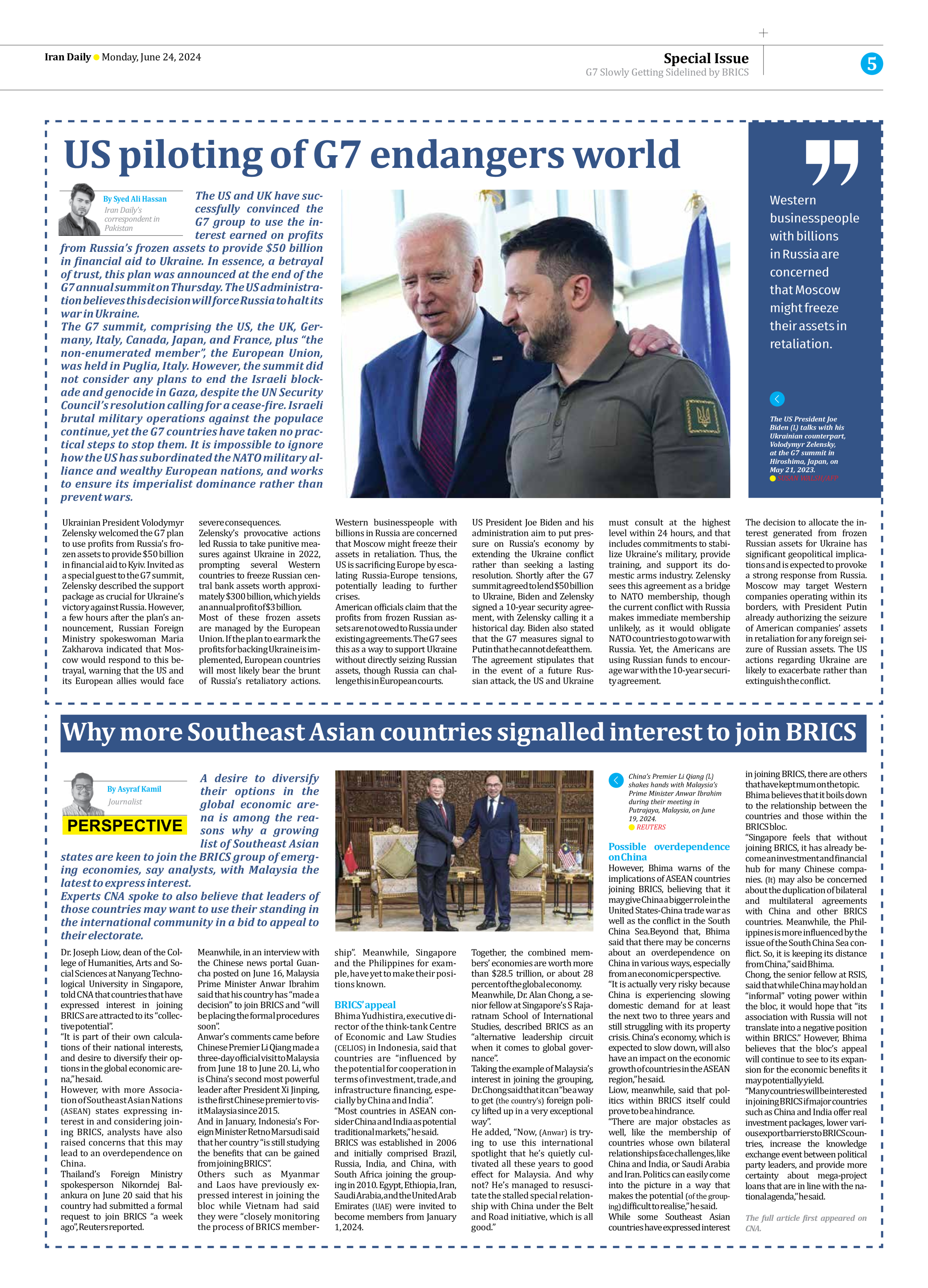
Why more Southeast Asian countries signalled interest to join BRICS
A desire to diversify their options in the global economic arena is among the reasons why a growing list of Southeast Asian states are keen to join the BRICS group of emerging economies, say analysts, with Malaysia the latest to express interest. Experts CNA spoke to also believe that leaders of those countries may want to use their standing in the international community in a bid to appeal to their electorate.
By Asyraf Kamil
Dr. Joseph Liow, dean of the College of Humanities, Arts and Social Sciences at Nanyang Technological University in Singapore, told CNA that countries that have expressed interest in joining BRICS are attracted to its “collective potential”.
“It is part of their own calculations of their national interests, and desire to diversify their options in the global economic arena,” he said.
However, with more Association of Southeast Asian Nations (ASEAN) states expressing interest in and considering joining BRICS, analysts have also raised concerns that this may lead to an overdependence on China.
Thailand’s Foreign Ministry spokesperson Nikorndej Balankura on June 20 said that his country had submitted a formal request to join BRICS “a week ago”, Reuters reported.
Meanwhile, in an interview with the Chinese news portal Guancha posted on June 16, Malaysia Prime Minister Anwar Ibrahim said that his country has “made a decision” to join BRICS and “will be placing the formal procedures soon”.
Anwar’s comments came before Chinese Premier Li Qiang made a three-day official visit to Malaysia from June 18 to June 20. Li, who is China’s second most powerful leader after President Xi Jinping, is the first Chinese premier to visit Malaysia since 2015.
And in January, Indonesia’s Foreign Minister Retno Marsudi said that her country “is still studying the benefits that can be gained from joining BRICS”.
Others such as Myanmar and Laos have previously expressed interest in joining the bloc while Vietnam had said they were “closely monitoring the process of BRICS membership”. Meanwhile, Singapore and the Philippines for example, have yet to make their positions known.
BRICS’ appeal
Bhima Yudhistira, executive director of the think-tank Centre of Economic and Law Studies (CELIOS) in Indonesia, said that countries are “influenced by the potential for cooperation in terms of investment, trade, and infrastructure financing, especially by China and India”.
“Most countries in ASEAN consider China and India as potential traditional markets,” he said.
BRICS was established in 2006 and initially comprised Brazil, Russia, India, and China, with South Africa joining the grouping in 2010. Egypt, Ethiopia, Iran, Saudi Arabia, and the United Arab Emirates (UAE) were invited to become members from January 1, 2024.
Together, the combined members’ economies are worth more than $28.5 trillion, or about 28 percent of the global economy.
Meanwhile, Dr. Alan Chong, a senior fellow at Singapore’s S Rajaratnam School of International Studies, described BRICS as an “alternative leadership circuit when it comes to global governance”.
Taking the example of Malaysia’s interest in joining the grouping, Dr. Chong said that it can “be a way to get (the country’s) foreign policy lifted up in a very exceptional way”.
He added, “Now, (Anwar) is trying to use this international spotlight that he’s quietly cultivated all these years to good effect for Malaysia. And why not? He’s managed to resuscitate the stalled special relationship with China under the Belt and Road initiative, which is all good.”
Possible overdependence on China
However, Bhima warns of the implications of ASEAN countries joining BRICS, believing that it may give China a bigger role in the United States-China trade war as well as the conflict in the South China Sea.Beyond that, Bhima said that there may be concerns about an overdependence on China in various ways, especially from an economic perspective.
“It is actually very risky because China is experiencing slowing domestic demand for at least the next two to three years and still struggling with its property crisis. China’s economy, which is expected to slow down, will also have an impact on the economic growth of countries in the ASEAN region,” he said.
Liow, meanwhile, said that politics within BRICS itself could prove to be a hindrance.
“There are major obstacles as well, like the membership of countries whose own bilateral relationships face challenges, like China and India, or Saudi Arabia and Iran. Politics can easily come into the picture in a way that makes the potential (of the grouping) difficult to realise,” he said.
While some Southeast Asian countries have expressed interest in joining BRICS, there are others that have kept mum on the topic.
Bhima believes that it boils down to the relationship between the countries and those within the BRICS bloc.
“Singapore feels that without joining BRICS, it has already become an investment and financial hub for many Chinese companies. (It) may also be concerned about the duplication of bilateral and multilateral agreements with China and other BRICS countries. Meanwhile, the Philippines is more influenced by the issue of the South China Sea conflict. So, it is keeping its distance from China,” said Bhima.
Chong, the senior fellow at RSIS, said that while China may hold an “informal” voting power within the bloc, it would hope that “its association with Russia will not translate into a negative position within BRICS.” However, Bhima believes that the bloc’s appeal will continue to see to its expansion for the economic benefits it may potentially yield.
“Many countries will be interested in joining BRICS if major countries such as China and India offer real investment packages, lower various export barriers to BRICS countries, increase the knowledge exchange event between political party leaders, and provide more certainty about mega-project loans that are in line with the national agenda,” he said.
The full article first appeared on CNA.







